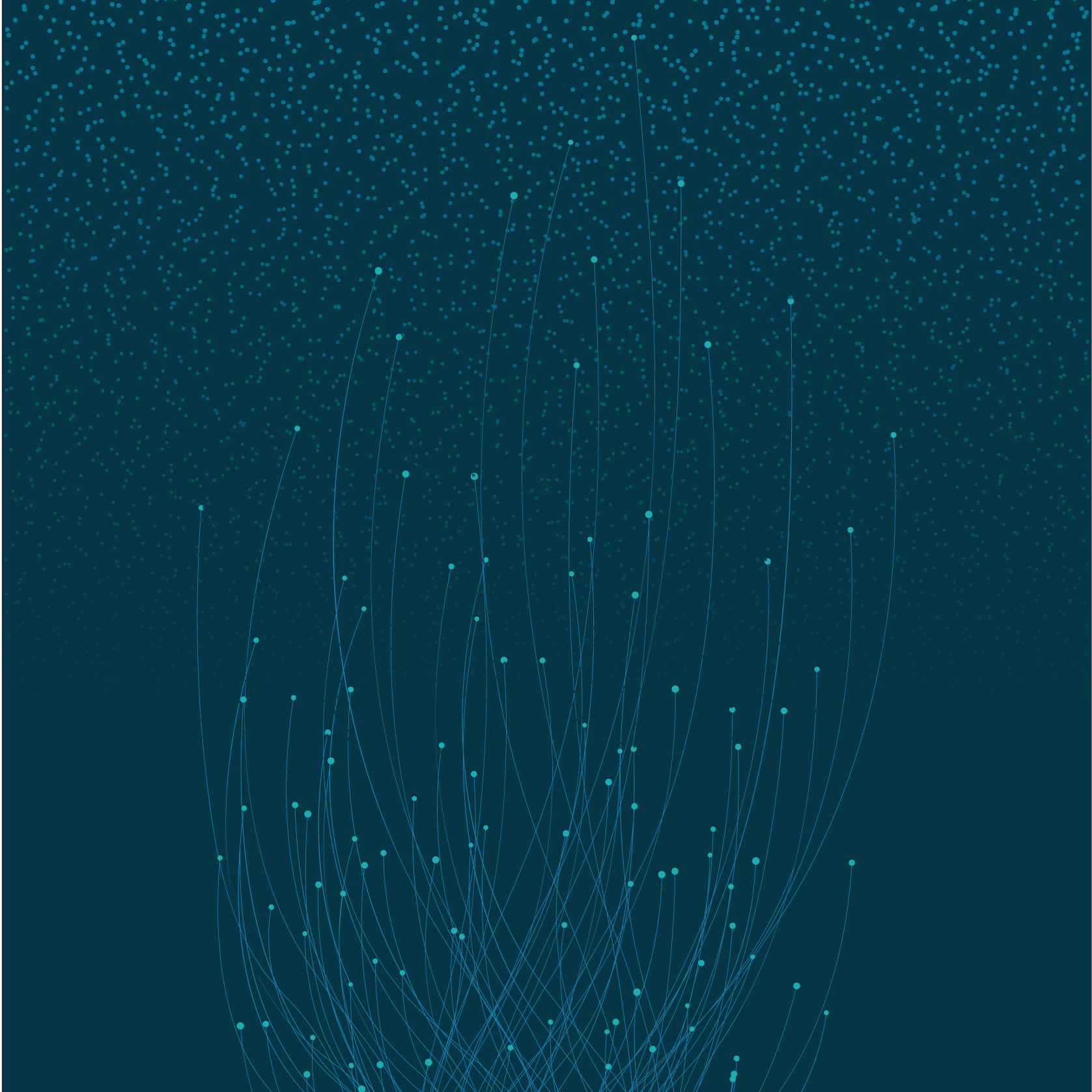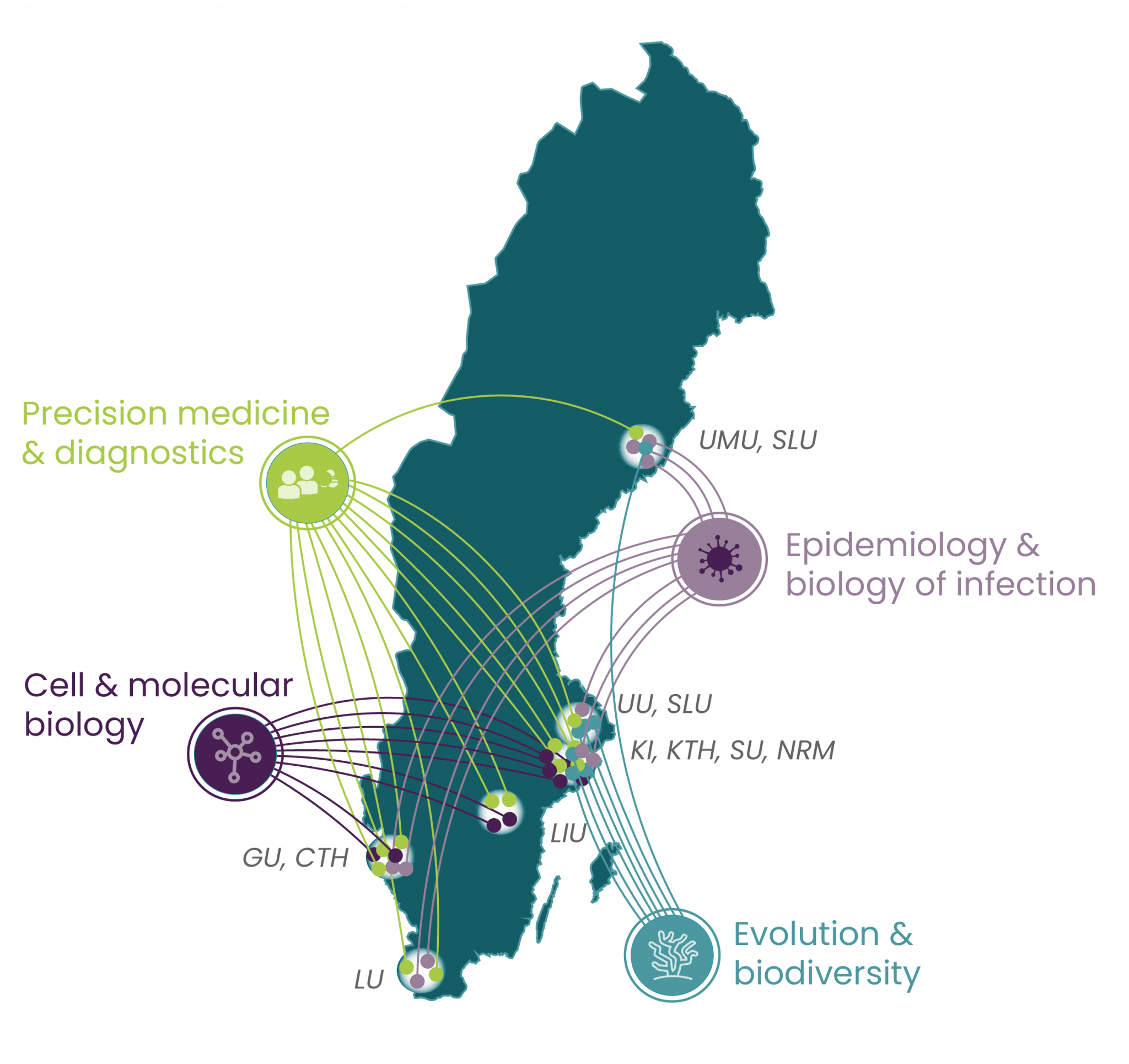Fellows recruitment
The practice of life science is continuously becoming more data-dependent. The amount and complexity of data is growing exponentially, and more scientific discoveries are enabled when data is openly available to researchers across the world. This is the basis for the SciLifeLab and Wallenberg National Program on Data-Driven Life Science (DDLS), which now sets out on its mission to recruit and train the next generation of life scientists.

Get to know some of our DDLS Fellows and their journeys
Interested in applying?
Accelerate the paradigm shift in life sciences
As a DDLS Fellow, you will be part of the next-generation of data-driven life scientists and create globally leading computational and data science capabilities in life science in Sweden. You will accelerate the data-driven paradigm shift in life sciences, and conduct research at the global frontline within your field of interest.
Advances in computational capabilities, AI, machine learning and other technologies, provide enormous new opportunities for unbiased ways to analyze data and to promote biological discoveries, insights on life as well as promote innovation and translate research into societal benefits.
Take part in forming a research community of world-leading caliber
As a DDLS Fellow, you will be recruited directly to the participating organization, which means you’ll be able to utilize its strong local research environment and unique capabilities. At the same time, you’re connected to the national DDLS program, and you take part in forming a strong, interdisciplinary community with researchers working with the rapidly expanding resources and needs of open data in life sciences, creating synergies for the entire life science ecosystem.
You’ll also be connected to SciLifeLab’s infrastructure – spanning technologies and expertise within everything from genomics, metabolomics and spatial omics, to drug development, diagnostics, single cell biology and bioinformatics – and the dynamic research community formed around it.


Connect with initiatives across disciplines and sectors
All DDLS fellows will be focused on one of the four strategic research areas within the program (cell and molecular biology, precision medicine and diagnostics, evolution and biodiversity, epidemiology and infection biology), and will interact within as well as across the areas.
The program also promotes collaborations with industry, healthcare and other national and international partners – such as WASP (the Wallenberg AI, Autonomous Systems and Software Program, with the aim of bridging the life science and data science communities) and the Wallenberg Centers for Molecular Medicine (WCMM).
Tenure track positions
SciLifeLab, DDLS, and the hosting universities care deeply about supporting the long-term career of all fellows, and recruitments will usually be done under tenure track principles, with an evaluation (typically after 4-5 years) assessing whether the criteria for permanent tenured faculty employment are fulfilled. All fellow positions hosted at the higher education institutions (i.e., apart from NRM) will be as “associate senior lecturer”, which means 4-6 years of employment and a guaranteed right to apply for non-competitive tenure promotion before the end of this period. Each higher education institution decides the formal assessment criteria of their evaluation, which typically involves proven excellence in research, teaching and leadership (see UHR, The Higher Education Ordinance). The tenure track period can be extended due to parental leave, sick leave, or other special grounds. While the tenure track legislation and appointment does not formally apply to NRM, the recruitment will be handled similarly, and the successful candidate will be evaluated non-competitively with an opportunity for permanent tenured employment. Fellows at MIMS, the Swedish EMBL node at Umeå University, will be supported for up to 9 years depending on a successful midterm evaluation in research-focused positions without tenure track that follow principles of the EMBL group leader model.
Why choose Sweden?
Conduct your research in an innovation hotspot
Despite its relatively small population of around 10 million people, Sweden is home to some of the world’s best universities. It is ranked among the world leaders in higher education and its universities regularly place highly in global rankings like the Times Higher Education World University Rankings and the Shanghai Jiao Tong Academic Ranking of World Universities.
Sweden is recognized as one of the most innovative countries in the world. The emphasis on independent studies and the fact that Sweden’s investment in research is among the highest in the world in relation to GDP, are key reasons for that. The capacity for innovation has been built through a long-term focus on education, research and development, with both broad and specialized research. An active research policy has enabled Sweden to acquire leading positions in several areas, one of them being life sciences, and in 2018, the government created a life science office, dedicated to further promoting the field.
The spirit of innovation is strong, with initiatives at the cutting-edge of sustainable development and technological advancement, which is reflected in the higher education institutions, where you have the tools to drive development and can utilize the strong innovation ecosystem (offering support systems for both researchers as well as organizations seeking university collaborations).
(Read more: sweden.se, Higher Education and Research, Innovation in Sweden, Universities Aiming for Innovation)


Live a good life with your family near
SWEDEN IS A progressive country in the sense that workplace cultures generally encourage a healthy work-life balance. This is possible because of existing well-developed public services and a social insurance system that offers many rights and benefits
For instance, you don’t have to worry about the cost of healthcare, childcare or your children’s education, as state subsidies make these and other aspects of life affordable, and many benefits are free of charge. Workers’ rights and equality are cornerstones of the labor market, and you have sickness benefits, 18 months of paid parental leave per child and job security when you return to work.
And not to forget, you always have nature close by. Lakes and deep forests, and depending on where you visit, everything from alpine peaks, midnight sun and northern lights, to rolling countryside, majestic coastlines, and archipelagos with windswept islands. Even in Sweden’s largest cities, nature is never far away.
Read more in the book: A Beginner’s Guide to Swedish Academia launched by Young Academy of Sweden for international researchers, to help navigate Swedish academia and remove time-consuming obstacles.
Want to know more about working in Swedish academia?
Check out sweden.se and the participating organizations’ websites:
Hear from Fellows in Swedish life science research
Want to know more about what it’s like to be a Fellow in life sciences, connected to SciLifeLab, nationwide networks and cutting-edge infrastructure? Hear about it from a few of the fellows within the SciLifeLab Fellows program.

New DDLS Fellow: Abhishek Niroula
Meet Abhishek Niroula (GU), a recent SciLifeLab & Wallenberg National Program for Data-Driven Life Science (DDLS) fellow. Learn more about Abhishek in our latest Q&A-style article. He will be joining the DDLS Precision medicine and diagnostics research area.


New DDLS Fellow: Tom van der Valk
Get to know our latest DDLS Fellow, Tom van der Valk (NRM), in our latest Q&A style article. He will be joining the Evolution and biodiversity research area.

Enabling interdisciplinary research to understand life from all different perspectives
In the first episode of the SciLifeLab Talk Show 2020, we check in with SciLifeLab Fellow Sarahi Garcia (Stockholm University) to hear more about her research and newly started group. What’s her passion, and why did she become a researcher?
“I really appreciate that SciLifeLab is looking to invest in technology to be able to understand all levels of biology. And I think it’s a great opportunity to interact with different types of scientists that think different than I do, and that we can become more interdisciplinary as we interact”, Sarahi says.
“Coming from an engineering perspective, working as material engineers, being within SciLifeLab has really helped us to talk with medical scientists and get closer to the clinics in order to identify the needs there. And to then really develop the nanotechnology towards real application, towards what is needed in the clinics. This wouldn’t be possible if we wouldn’t be located in this type of community. And of course, also supported by the infrastructure of SciLifeLab, that gives us access to state-of-the-art imaging techniques. So we are really […] expanding our research into areas which I don’t think we would have been in otherwise”, says Alexandra Teleki.
Connecting to SciLifeLab at different stages of your scientific career
In episode 4 of the SciLifeLab Talk Show 2020, we meet SciLifeLab Fellows Alexandra Teleki, researcher at Uppsala University, and Paul Hudson, researcher at KTH Royal Institute of Technology, and hear what being connected to SciLifeLab has meant to their research. We also meet Alba Corman, at the time doing her last year as a PhD student at Karolinska Institutet (and previous member of the SciLifeLab PhD Council) and a number of other researchers.
“Being connected to SciLifeLab has meant that my research has expanded quite a bit […]. It’s exposed us to new technology, like next generation sequencing, quantitative proteomics, microfluidics… State-of-the-art technology that we now have access to and people to collaborate with to help us learn these technologies. It’s allowed us to answer questions about bacterial metabolism that I don’t think would have been possible without. And selfishly, it’s also allowed me to separate myself in the field. Carve out a niche for myself, and sort of take a unique angle in this field of bio sustainability”, says Paul Hudson.
Infusing key competencies into Sweden’s life science research
“It’s been a great experience working at SciLifeLab, it’s really been a wonderful ride so far. Setting up the lab, having sufficient funding to pursuit also slightly more ambitious and risky projects, and working with a wonderful group of young talented scientist”, Sebastian Deindl says. “I think for me, the first and foremost benefit has been to be part of the SciLifeLab Fellows community, where you have many talented scientists recruited from many different places in the world, having different backgrounds and training, and it really makes for a very sort of dynamic and young spirit.”
“One of the primary benefits of the unique environment that SciLifeLab provides, is that it allows for establishment of new and interdisciplinary collaborations. I have gained, during the time I was working at SciLifeLab, that I got exposed to a new research direction. In my group, we study the molecular aspects of bacterial cell cycle regulation and growth control, and we have started a collaboration to address how the molecular mechanisms that we study in the lab, are relevant to bacteria outside in the nature. And so, this opens up many new questions that I’m very interested to address in the future, and I’m sure that I would not have entered this new research area if I would have been at a different institute”, says Kristina Jonas.
In this video, we meet, among others, SciLifeLab Fellows Sebastian Deindl (Uppsala University) and Kristina Jonas (Stockholm University) and learn more about their research and experience being SciLifeLab Fellows.
About the recruitments
Over the years, the program aims to:
- Recruit 39 future research leaders as DDLS Fellows
- Establish a graduate school for 260 PhD students in academia and industry
- Create 210 postdoctoral positions in academia and industry.
The DDLS Fellows will be recruited to the participating organizations, enabling them to utilize the strong local research environments. At the same time, they will be connected to the national DDLS program, cultivating a strong, interdisciplinary community of researchers working with the rapidly expanding resources and needs of open data in life sciences.
Each recruitment package has a budget of 17 MSEK to cover salary for 5 years as DDLS Fellow, two PhD positions and two postdoc positions, as well as running costs. Distribution of DDLS fellow positions to the participating organizations was pre-defined in the donation letter from KAW. Most of the Fellow positions are tenure-track, and the respective hosting universities/organizations take long-term responsibility of tenured group leaders.
The DDLS Fellows will be recruited to the four strategic research areas of the program, in two rounds – 2021 and 2024. Read more about the recruitments on DDLS Fellows recruitments.

DDLS Fellows recruitments – 2021
The first round of recruitments for DDLS Fellows, opens in June, 2021.
A total of 20 Fellows will be recruited in the 2021 round, distributed across the program’s four strategic research areas and 11 participating organizations. Recruitment packages are distributed as presented in the list below.
- KTH: 1
- Stockholm University: 2
- Linköping University: 1
- Chalmers University of Technology: 1
- Uppsala University: 1
- Swedish University of Agricultural Sciences (SLU): 1
- Museum of Natural History (NRM): 1
- KTH: 1
- Karolinska Institutet: 1
- Linköping University: 1
- University of Gothenburg: 1
- Chalmers University of Technology: 1
- Lund University: 1
- Umeå University: 1
- Uppsala University: 1
Karolinska Institutet: 1 - University of Gothenburg: 1
- Lund University: 1
- Umeå University: 1
DDLS Fellows recruitments – 2024
In 2024, a total of 19 fellows will be recruited, distributed across the program’s four strategic research areas and 11 participating organizations. Recruitment packages are distributed as presented in the list below.
- KTH: 1
- Stockholm University: 1
- Linköping University: 1
- Chalmers University of Technology: 1
- Stockholm University: 1
- Uppsala University: 1
- Swedish University of Agricultural Sciences (SLU): 1
- Museum of Natural History (NRM): 1
- Uppsala University: 1
KTH: 1 - Karolinska Institutet: 1
- Linköping University: 1
- University of Gothenburg: 1
- Lund University: 1
- Karolinska Institutet: 1
- University of Gothenburg: 1
- Lund University: 1
- Umeå University: 2